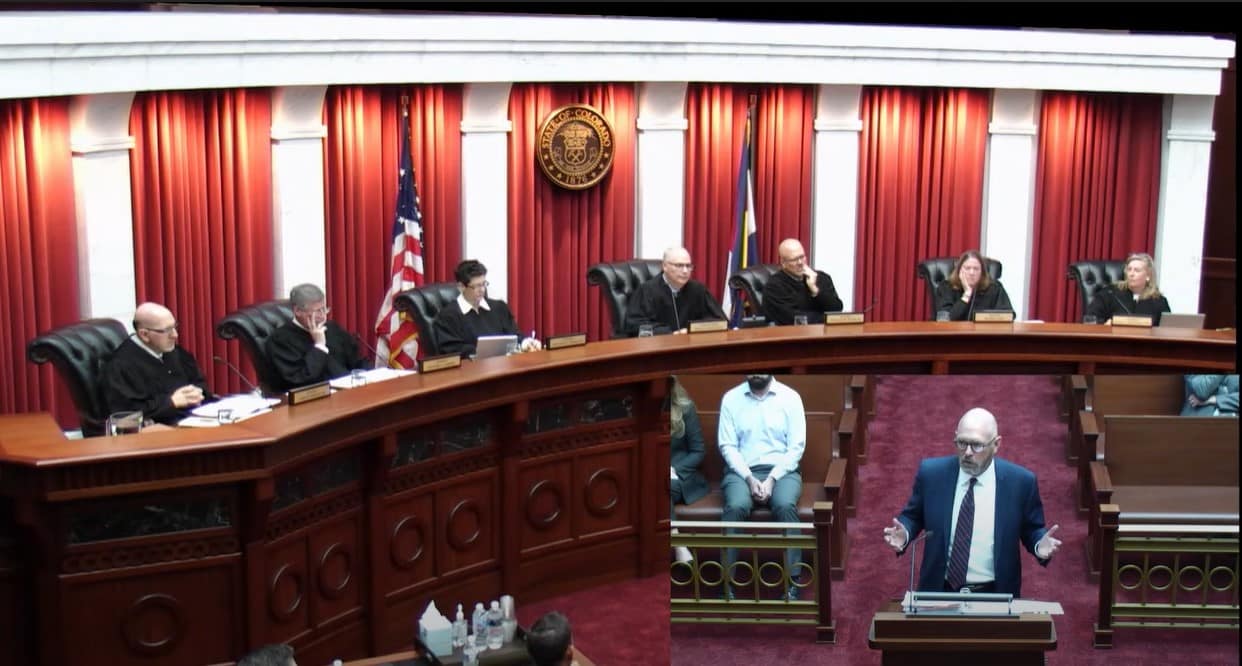
Denver divorce attorney Brenda Storey is fighting to keep her law license. (Photo courtesy of Facebook)
A Denver divorce attorney who badgered a broke client to pay her and covertly banked a couple’s tax refund can have her law license suspended, the Colorado Supreme Court ruled Tuesday
In June 2021, a three-member state disciplinary board determined that Brenda Storey should lose the law license she has had since 1995 for one year and one day. Storey appealed that decision to the Supreme Court, which issued its opinion this week.
The high court determined Storey violated four of the five rules that the disciplinary board accused her of violating. It ordered the board to give Storey a lighter sentence than the one-year suspension but didn’t say what that new punishment should be.
Storey’s conduct occurred during the divorce of Cynthia Sullivan from her husband, Patrick Caldwell Sullivan, between 2018 and 2020. Storey represented Sullivan, the wife. The couple had $3.3 million in assets to split but because Caldwell Sullivan, a real estate agent, was the sole earner, and Sullivan was broke by mid-2019.
Storey told Sullivan to sell the couple’s furniture and anything else she could in order to pay Storey. Sullivan later testified that she was “completely in shock” at Storey’s behavior, since her attorney knew she was “really hurting for money.” Sullivan felt threatened.

Brenda Storey’s attorney, Michael McConnell, bottom right, speaks before the Colorado Supreme Court on June 21. (Screenshot)
“You do not have a choice as to whether you pay me in full. To me, my bill is the highest priority over your sprinkler bill, school supplies, or otherwise,” Storey wrote in one email.
When an Internal Revenue Service check for $47,578 arrived at Sullivan’s door one day in 2019, Storey advised her client not to tell Caldwell Sullivan, even though the check was written to both of them. Sullivan signed the check over to Storey’s law firm.
Storey later threatened to withdraw from the case if Sullivan could not pay the $5,250 she still owed. In an email demanding payment, Storey claimed that if she wasn’t paid, she would have to file financial documents which would show Sullivan had made a large one-time payment and Sullivan’s husband “will be pushing you about from where that money came.” Sullivan later testified that she read the email as a “direct threat” to expose her.
Last year, the disciplinary board determined that Storey was initially told by a judge to return the IRS check money in October 2019 but didn’t do so until March 2020, in violation of the state’s rules for attorneys. But the Supreme Court ruled Tuesday that evidence of this was “at a minimum, confusing” and overturned the board’s decision on that charge.
The disciplinary board must now issue a new punishment for Storey on the four violations that the Supreme Court agreed Storey committed. It will be the first time she has been disciplined in her career. She and her attorney did not answer requests for comment.

Denver divorce attorney Brenda Storey is fighting to keep her law license. (Photo courtesy of Facebook)
A Denver divorce attorney who badgered a broke client to pay her and covertly banked a couple’s tax refund can have her law license suspended, the Colorado Supreme Court ruled Tuesday
In June 2021, a three-member state disciplinary board determined that Brenda Storey should lose the law license she has had since 1995 for one year and one day. Storey appealed that decision to the Supreme Court, which issued its opinion this week.
The high court determined Storey violated four of the five rules that the disciplinary board accused her of violating. It ordered the board to give Storey a lighter sentence than the one-year suspension but didn’t say what that new punishment should be.
Storey’s conduct occurred during the divorce of Cynthia Sullivan from her husband, Patrick Caldwell Sullivan, between 2018 and 2020. Storey represented Sullivan, the wife. The couple had $3.3 million in assets to split but because Caldwell Sullivan, a real estate agent, was the sole earner, and Sullivan was broke by mid-2019.
Storey told Sullivan to sell the couple’s furniture and anything else she could in order to pay Storey. Sullivan later testified that she was “completely in shock” at Storey’s behavior, since her attorney knew she was “really hurting for money.” Sullivan felt threatened.

Brenda Storey’s attorney, Michael McConnell, bottom right, speaks before the Colorado Supreme Court on June 21. (Screenshot)
“You do not have a choice as to whether you pay me in full. To me, my bill is the highest priority over your sprinkler bill, school supplies, or otherwise,” Storey wrote in one email.
When an Internal Revenue Service check for $47,578 arrived at Sullivan’s door one day in 2019, Storey advised her client not to tell Caldwell Sullivan, even though the check was written to both of them. Sullivan signed the check over to Storey’s law firm.
Storey later threatened to withdraw from the case if Sullivan could not pay the $5,250 she still owed. In an email demanding payment, Storey claimed that if she wasn’t paid, she would have to file financial documents which would show Sullivan had made a large one-time payment and Sullivan’s husband “will be pushing you about from where that money came.” Sullivan later testified that she read the email as a “direct threat” to expose her.
Last year, the disciplinary board determined that Storey was initially told by a judge to return the IRS check money in October 2019 but didn’t do so until March 2020, in violation of the state’s rules for attorneys. But the Supreme Court ruled Tuesday that evidence of this was “at a minimum, confusing” and overturned the board’s decision on that charge.
The disciplinary board must now issue a new punishment for Storey on the four violations that the Supreme Court agreed Storey committed. It will be the first time she has been disciplined in her career. She and her attorney did not answer requests for comment.
